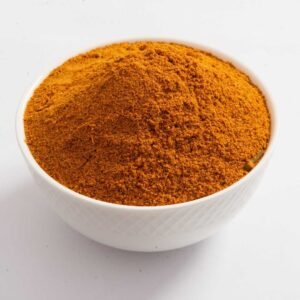Top 5 Health Benefits of Haldi (Turmeric)
Haldi, also known as turmeric, is a golden-yellow spice that holds an important place in Indian culture, cooking, and Ayurveda. Apart from being used in food, it is also considered sacred and is a part of rituals like the haldi ceremony before weddings.
In the kitchen, haldi is a key ingredient in curries, dals, and even healthy drinks like haldi ka doodh (turmeric milk), known for its healing properties. The main active compound in turmeric is curcumin, which gives it strong medicinal value.

Top 5 Health Benefits of Haldi
1. Rich in Bioactive Compounds
Haldi contains powerful bioactive substances, especially curcumin, that may support immunity, digestion, and overall health. Since curcumin is fat-soluble, it works better when consumed with healthy fats or oils, such as in curries or golden milk.
2. Natural Anti-Inflammatory
Curcumin acts as a natural anti-inflammatory agent. While very high doses are usually required for therapeutic results, regular consumption of turmeric may help reduce inflammation in conditions like arthritis and joint pain.
3. Strong Antioxidant Properties
Oxidative stress caused by free radicals can damage cells and speed up ageing. Turmeric is a powerful antioxidant that helps neutralize these free radicals. This makes haldi beneficial for protecting cells and supporting long-term health.
4. Supports Brain Function
Curcumin may help improve brain-derived neurotrophic factor (BDNF), a protein linked to memory, mood, and learning. Low levels of BDNF are connected with issues like depression and Alzheimer’s disease. By boosting BDNF, turmeric may support brain health and delay age-related decline, though more studies are needed.
5. Good for Heart Health
Heart disease is one of the leading causes of death globally. Turmeric may help improve heart function by reducing inflammation, oxidative stress, and improving blood vessel health. Regular intake of turmeric as part of a balanced diet can support a healthy heart.
Possible Side Effects of Haldi
For most people, using haldi in food or drinks is safe. However, in some cases:
Those with spice allergies may experience rashes, itching, or stomach upset.
Very high doses of curcumin supplements (pills, capsules, or gummies) can sometimes cause digestive discomfort.
It is always best to consume turmeric in natural food form unless advised otherwise by a doctor.
Conclusion
Haldi is more than just a kitchen spice – it is a powerful Ayurvedic medicine with benefits ranging from reducing inflammation to boosting heart and brain health. Including turmeric in your daily diet, whether in curries or golden milk, is one of the simplest ways to improve overall wellness naturally.
Frequently Asked Questions
Q1. What is Haldi (Turmeric)?
Haldi, also known as turmeric, is a yellow spice derived from the root of the Curcuma longa plant, widely used in cooking and Ayurveda.
Q2. What are the health benefits of Haldi?
Haldi is known for its anti-inflammatory, antioxidant, digestive, and immune-boosting properties. It also supports skin and joint health.
Q3. Can Haldi help in boosting immunity?
Yes, the curcumin in Haldi strengthens the immune system and helps the body fight infections naturally.
Q4. How is Haldi used in skincare?
Haldi is used in face packs, creams, and soaps for glowing skin. It reduces acne, blemishes, and pigmentation.
Q5. What is Golden Milk (Haldi Doodh)?
Golden Milk is a traditional Ayurvedic drink made with milk, Haldi, and spices that supports immunity and improves sleep.
